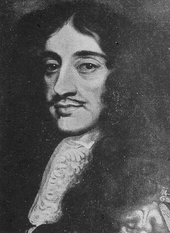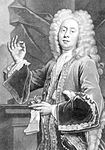User:Catnik/sandbox

The Country Wife is a Restoration comedy written in 1673 by William Wycherley. A product of the tolerant early Restoration period, the play reflects an aristocratic and anti-Puritan ideology, and was controversial for its sexual explicitness even in its own time. The title itself contains a lewd pun. It is based on several plays by Molière, with added features that 1670s London audiences demanded: colloquial prose dialogue in place of Molière's verse, a complicated, fast-paced plot tangle, and many sex jokes.
Background[edit]

After the 18-year Puritan stage ban was lifted at the Restoration of the monarchy in 1660, the theatrical life of London recreated itself quickly and abundantly. During the reign of Charles II (1660–1685), playwrights such as John Dryden, George Etherege, Aphra Behn, and William Wycherley wrote comedies that triumphantly reassert aristocratic dominance and prestige after the years of middle class power during Oliver Cromwell's Commonwealth. Reflecting the atmosphere of the Court, these plays celebrate a lifestyle of sensual intrigue and conquest, especially conquest that served to humiliate the husbands of the London middle classes and to avenge, in the sensual arena, the marginalization and exile suffered by royalists under Cromwell. Charles' personal interest in the stage nourished Restoration drama, and his most favoured courtiers were poets, playwrights, and men of wit, such as John Wilmot, Earl of Rochester, Charles Sackville, Earl of Dorset, and William Wycherley. Wycherley had no title or wealth, but had by 1675 already recommended himself by two well-received comedies and had been admitted to the inner circle, sharing the conversation and sometimes the mistresses of Charles, who "was extremely fond of him upon account of his wit".[1] In 1675, at age 35 (at the time the portrait top right was painted), he created a sensation with The Country Wife, greeted as the bawdiest and wittiest play yet seen on the English stage.
Like Charles II, Wycherley had spent some Commonwealth years in France and become interested in French drama, and throughout his short playwriting career (1671–1676) he would borrow plotlines and techniques from French plays, particularly Molière. However, in contrast to the French, English audiences of the 1670s had no enthusiasm for structurally simple comedies or for the neoclassical unities of time, place, and action, but demanded fast pace, lots of complications, and above all "variety." To achieve the much denser texture and more complex plotting that pleased in London, Wycherley would combine several source plays to produce bustling action and clashing moods, ranging from farce through paradox to satire.
A Restoration novelty of which Wycherley took advantage was the readiness of public opinion to accept women on stage, for the first time in British history. Audiences were fascinated to see real women reverse the cross-dressing of the Elizabethan boy actors and appear in tight-fitting male outfits in the popular breeches roles, and to hear them match or even outdo the rake heroes in repartee and double entendre. Charles' choice of actresses as mistresses, notably Nell Gwyn, helped keep the interest fresh.
Plots[edit]
Key scenes[edit]
First performance[edit]
Stage history[edit]
Critical reception[edit]
Modern criticism[edit]
Notes[edit]
- ^ Richardson Pack, Memoirs of Mr. Wycherley's Life (1728), 8; quoted by Ogden, 4.
References[edit]
- Canfield, Douglas (1997). Tricksters and Estates: On the Ideology of Restoration Comedy. Lexington, Kentucky: The University Press of Kentucky.
- Dixon, Peter (1996). William Wycherley: The Country Wife and Other Plays. Oxford: Oxford University Press.
- Dobrée, Bonamy (1924). Restoration Comedy 1660–1720. Oxford: Clarendon Press.
- Holland, Norman N. (1959). The First Modern Comedies: The Significance of Etherege, Wycherley and Congreve. Cambridge, Massachusetts.
- Howe, Elizabeth (1992). The First English Actresses: Women and Drama 1660–1700. Cambridge: Cambridge University Press.
- Hunt, Leigh (ed.) (1840). The Dramatic Works of Wycherley, Congreve, Vanbrugh and Farquhar.
- Macaulay, Thomas Babington (1841). Review of Leigh Hunt, ed. The Dramatic Works of Wycherley, Congreve, Vanbrugh, and Farquhar, in Critical and Historical Essays, Vol. 2. Retrieved February 6, 2005.
- Pepys, Samuel (ed. Henry Benjamin Wheatley, 1880). The Diary of Samuel Pepys. Retrieved March 14, 2005.
- Wilson, John Harold (1969). Six Restoration Plays. Boston: Houghton Mifflin.
- Zimbardo, Rose A. (1965). Wycherley's Drama: A Link in the Development in English Satire. Yale.
Further reading[edit]
External links[edit]
Template:Featured article is only for Wikipedia:Featured articles.
Category:Restoration comedy
Category:1673 plays
Category:Plays by William Wycherley


